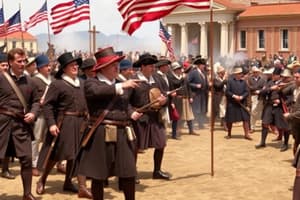Podcast
Questions and Answers
What are debtors?
What are debtors?
People who owe money that they can’t pay.
What was the Great Awakening?
What was the Great Awakening?
A religious revival that impacted the English colonies in America during the 1730s and 1740s.
What is the House of Burgesses?
What is the House of Burgesses?
The earliest of the elected legislatures established shortly after Jamestown’s founding.
What are indentured servants?
What are indentured servants?
What was the Mayflower Compact?
What was the Mayflower Compact?
What is mercantilism?
What is mercantilism?
Which states are considered Mid-Atlantic Colonies?
Which states are considered Mid-Atlantic Colonies?
What was the Middle Passage?
What was the Middle Passage?
Which states are considered New England Colonies?
Which states are considered New England Colonies?
Who was James Oglethorpe?
Who was James Oglethorpe?
Flashcards are hidden until you start studying
Study Notes
Colonial Foundations Vocabulary
- Debtors: Individuals unable to repay borrowed money, often leading to imprisonment or indentured servitude in colonial contexts.
- Great Awakening: A significant religious revival in the 1730s and 1740s that fostered new denominations and increased religious participation in the English colonies.
- House of Burgesses: Established after the founding of Jamestown, this was the first elected legislative assembly in the American colonies, representing a step towards self-governance.
- Indentured Servants: Laborers who agreed to work without pay for a specific number of years in exchange for passage to America, housing, and food, effectively a form of debt repayment.
- Mayflower Compact: A foundational document signed in 1620 by the Pilgrims, it established a self-governing agreement and set a precedent for future governance in America.
- Mercantilism: An economic theory promoting governmental regulation of a nation's economy for augmenting state power, characterized by a favorable balance of trade and accumulation of precious metals.
- Mid-Atlantic Colonies: Consisted of New York, Pennsylvania, New Jersey, and Delaware, known for diverse populations and economies based on agriculture and commerce.
- Middle Passage: The brutal sea voyage that enslaved Africans endured, transporting them from West Africa to the Americas, marked by appalling conditions and high mortality rates.
- New England Colonies: Comprised Massachusetts, Rhode Island, Connecticut, and New Hampshire; known for their Puritan roots, early education emphasis, and economy focused on trade and shipbuilding.
- Oglethorpe, James: The founder of Georgia in 1732, intended as a refuge for debtors and a strategic point to defend the Carolinas from Spanish Florida.
Studying That Suits You
Use AI to generate personalized quizzes and flashcards to suit your learning preferences.




